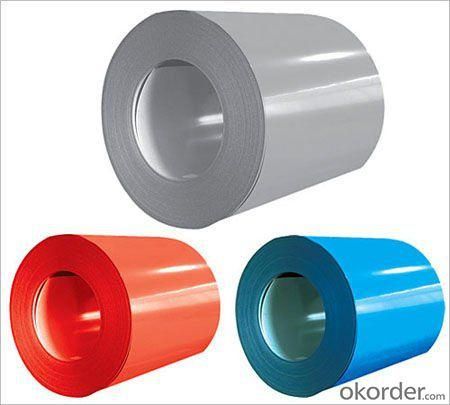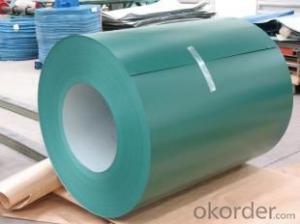Pre-Painted Steel Coil High Quality Green Color PPGI
- Loading Port:
- Shanghai
- Payment Terms:
- TT OR LC
- Min Order Qty:
- 200 m.t.
- Supply Capability:
- 20000 m.t./month
OKorder Service Pledge
OKorder Financial Service
You Might Also Like
1. Pre-Painted Galvanized/Aluzinc Steel Coil Description:
With GI as base material, after pretreatment (degrease and chemical treatment ) and liquid dope with several layers of color, then after firing and cooling, finally the plate steel is called pre-painted galvanized (aluzinc) steel. Pre-painted galvanized steel is good capable of decoration, molding, corrosion resistance. It generally displays superior workability, durability and weather resistance.
2.Main Features of the Pre-Painted Galvanized/Aluzinc Steel Coil:
• Excellent process capability
• Smooth and flat surface
• Workability, durability
• Excellent heat resistance performance
• High strength
• Good formability
• Good visual effect
3.Pre-Painted Galvanized/Aluzinc Steel Coil Images

4.Pre-Painted Galvanized/Aluzinc Steel Coil Specification
Standard: AISI, ASTM, BS, DIN, GB, JIS
Grade: DX51D, DX52D
Thickness: 0.17-2.0mm
Brand Name: KMRLON
Model Number: coil
Type: Steel Coil
Technique: Cold Rolled
Surface Treatment: Coated
Application: Boiler Plate
Special Use: High-strength Steel Plate
Width: 20-1250mm
Length: customized
commoidty: pre-painted galvanized steel coil
Thickness: 0.13-4.0mm
width: 20-1250mm
zinc coating: 40-180g/m2
printing thickness: top side: 20+/-5 microns, back side: 5-7 microns
color: all RAL color
surface treatment: color coated
coil weight: 4-7 tons
coil ID: 508/610mm
packaging: standard seaworthy packing
5.FAQ of Pre-Painted Galvanized/Aluzinc Steel Coil
1. What’s the application of this product?
Roof, roof structure, surface sheet of balcony, frame of window, etc.
2. What’s the brand of the paint?
We use the best brand of all of the word—AKZO.
3. How to guarantee the quality of the products?
We have established the international advanced quality management system,every link from raw material to final product we have strict quality test;We resolutely put an end to unqualified products flowing into the market. At the same time, we will provide necessary follow-up service assurance.
4. How long can we receive the product after purchase?
Usually within thirty working days after receiving buyer’s advance payment or LC. We will arrange the factory manufacturing as soon as possible. The cargo readiness usually takes 15-25 days, but the shipment will depend on the vessel situation.
- Q:How do steel coils contribute to the construction equipment industry?
- The construction equipment industry relies heavily on steel coils as they are vital for manufacturing various construction machinery and equipment. These coils, made from high-quality steel, are crucial components used in the fabrication of a wide range of construction equipment, including cranes, bulldozers, excavators, loaders, and forklifts. The main contribution of steel coils to the construction equipment industry lies in their structural strength and durability. Steel is renowned for its exceptional mechanical properties, such as high tensile strength, toughness, and resistance to wear and corrosion. These properties make it an ideal material for constructing heavy-duty machinery capable of withstanding the demanding conditions of construction sites. Steel coils are employed in the production of the structural components of construction equipment, such as chassis, frames, booms, buckets, and attachments. These components need to be sturdy and able to endure heavy loads, impacts, and continuous use. Steel coils provide the necessary strength and reliability to ensure the long-lasting performance of construction equipment. Moreover, steel coils are also used to manufacture specialized parts and accessories for construction machinery. These include hydraulic systems, gears, shafts, bearings, and fasteners. These components are essential for the proper functioning and efficiency of construction equipment, and steel coils provide the high-quality material required for their production. In addition to their mechanical properties, steel coils also contribute to the construction equipment industry through their versatility and customization options. Steel can be easily shaped, cut, welded, and formed into various sizes and shapes, allowing manufacturers to create equipment with specific designs and functionalities tailored to meet the diverse needs of construction projects. Overall, steel coils are indispensable in the construction equipment industry as they serve as the foundation for robust and reliable machinery. Their strength, durability, and versatility make them an essential raw material for manufacturing construction equipment that can withstand the challenges of construction sites and ensure the safety and efficiency of construction projects.
- Q:What are the different types of steel coil packaging machines?
- There are various types of steel coil packaging machines available in the market. Some common types include horizontal coil wrapping machines, vertical coil wrapping machines, strapping machines, and automatic stretch wrapping machines. Each type of machine is designed to package steel coils efficiently and securely, using different techniques such as wrapping, strapping, or stretch wrapping.
- Q:What are the different methods of heat treatment for steel coils?
- There are several different methods of heat treatment for steel coils, each with its own benefits and applications. 1. Annealing: This method involves heating the steel coils to a high temperature and then slowly cooling them, usually in a controlled atmosphere. Annealing helps to relieve internal stresses, improve ductility, and refine the grain structure of the steel, making it softer and more machinable. 2. Normalizing: Normalizing is similar to annealing, but the cooling process is typically faster. This treatment is often used to refine the grain structure and achieve a more uniform hardness throughout the steel coils. It also helps to remove any residual stresses and improve the mechanical properties of the material. 3. Quenching and tempering: In this two-step heat treatment process, the steel coils are first heated to a high temperature and then rapidly cooled by immersion in a quenching medium, such as oil or water. This causes the formation of a hard, brittle phase called martensite. To improve the toughness and reduce the brittleness, the coils are then reheated to a lower temperature and held there for a specific period of time. This process, known as tempering, helps to reduce the internal stresses and increase the ductility and toughness of the steel. 4. Case hardening: Case hardening is a heat treatment method used to increase the surface hardness of the steel coils while maintaining a relatively soft and ductile core. The process involves heating the coils in the presence of a carbon-rich atmosphere, allowing carbon to diffuse into the surface layer of the steel. This creates a hard outer layer, known as the case, while preserving the desired mechanical properties in the core. 5. Stress relieving: Stress relieving is performed by heating the steel coils to a specific temperature and holding them there for a sufficient period of time. This process helps to reduce residual stresses that may have been introduced during previous manufacturing or heat treatment processes. Stress relieving can improve dimensional stability, reduce the risk of distortion or cracking, and enhance the overall performance of the steel coils. Overall, the choice of heat treatment method for steel coils depends on the desired properties, intended application, and specific requirements of the end product. Each method has its own advantages and can be tailored to achieve the desired balance between hardness, toughness, ductility, and other mechanical properties.
- Q:Help me compare the speed of sound in air, water, and steel please?Thanks.
- Sound Speed In Water
- Q:What are the different methods of storing steel coils?
- There are several different methods of storing steel coils, including vertical stacking, horizontal stacking, eye-to-the-sky stacking, and interlocking stacking. Each method has its own advantages and considerations based on factors such as space availability, weight distribution, and accessibility for transportation and handling. Ultimately, the choice of storage method depends on the specific requirements and constraints of the steel coil storage facility.
- Q:What are the advantages of using steel coils in the manufacturing industry?
- There are several advantages of using steel coils in the manufacturing industry: 1. Strength and Durability: Steel coils are known for their high strength and durability, making them ideal for various manufacturing processes. They can withstand heavy loads and resist deformation, ensuring that the final product is reliable and long-lasting. 2. Versatility: Steel coils can be used in a wide range of applications across different industries. They are highly versatile and can be shaped, molded, or cut into different forms and sizes, making them suitable for diverse manufacturing needs. 3. Cost-effective: Steel coils are a cost-effective option for the manufacturing industry. Due to their strength and durability, they have a longer lifespan compared to other materials, reducing the need for frequent replacements. This leads to cost savings in the long run. 4. Excellent Thermal Conductivity: Steel has excellent thermal conductivity, meaning it can efficiently transfer heat. This makes steel coils suitable for applications that require temperature regulation, such as in the automotive and HVAC industries. 5. Recyclability: Steel is one of the most recycled materials globally. By using steel coils in the manufacturing process, companies contribute to a more sustainable and eco-friendly approach. Recycling steel reduces the need for raw materials extraction and energy consumption, resulting in a reduced carbon footprint. 6. Corrosion Resistance: Steel coils can be coated with protective layers, such as galvanization or anti-corrosion treatments, to enhance their resistance to rust and corrosion. This makes them suitable for outdoor applications or industries with corrosive environments. 7. Consistency and Quality: Steel coils offer consistent quality and uniformity in terms of dimensions, mechanical properties, and surface finish. This ensures that the end products meet the required specifications and maintain a high level of quality. In summary, the advantages of using steel coils in the manufacturing industry include their strength, durability, versatility, cost-effectiveness, excellent thermal conductivity, recyclability, corrosion resistance, and consistent quality. These benefits make steel coils a popular choice for various manufacturing processes across different industries.
- Q:why does steel have a density range when other metals do not?
- Steel is not a pure element it is an alloy. Steel is primarily iron but it has many elements blended in that change it's density including carbon,silicon, nickel, chrome, etc. Aluminum and copper , magnesium and so forth can be the pure element or they can be alloys too. If they are alloys, then their densities vary also
- Q:What are the common methods of joining steel coils together?
- The common methods of joining steel coils together include welding, mechanical fastening (such as using bolts or screws), and adhesive bonding.
- Q:I want to build an indoor riding arena, should I go for Steel ones.
- Though okorder /.. You can also have a look!!
- Q:What are the common welding methods used for steel coils?
- The common welding methods used for steel coils include shielded metal arc welding (SMAW), gas metal arc welding (GMAW), flux-cored arc welding (FCAW), and submerged arc welding (SAW).
1. Manufacturer Overview |
|
|---|---|
| Location | |
| Year Established | |
| Annual Output Value | |
| Main Markets | |
| Company Certifications | |
2. Manufacturer Certificates |
|
|---|---|
| a) Certification Name | |
| Range | |
| Reference | |
| Validity Period | |
3. Manufacturer Capability |
|
|---|---|
| a)Trade Capacity | |
| Nearest Port | |
| Export Percentage | |
| No.of Employees in Trade Department | |
| Language Spoken: | |
| b)Factory Information | |
| Factory Size: | |
| No. of Production Lines | |
| Contract Manufacturing | |
| Product Price Range | |
Send your message to us
Pre-Painted Steel Coil High Quality Green Color PPGI
- Loading Port:
- Shanghai
- Payment Terms:
- TT OR LC
- Min Order Qty:
- 200 m.t.
- Supply Capability:
- 20000 m.t./month
OKorder Service Pledge
OKorder Financial Service
Similar products
New products
Hot products
Related keywords





























